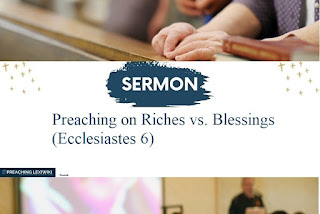Riches vs. Blessings: Finding Contentment in God's Provision (Ecclesiastes 6)
Introduction:
In our pursuit of happiness, we often chase after wealth and material possessions, believing they will bring us lasting satisfaction. But the book of Ecclesiastes, particularly chapter 6, challenges this notion, reminding us that true blessings come from God, not from our earthly accumulations. Today, we will explore Solomon's wisdom, learning to discern between fleeting riches and enduring blessings.
I. Enjoying Our Blessings: A Warning Against a Common Evil (Ecclesiastes 6:1-6)
A. A Common Evil to Beware Of (Ecclesiastes 6:1-2):
"There is an evil which I have seen under the sun, and it is common among men: A man to whom God has given riches and wealth and honor, so that he lacks nothing for himself of all he desires; yet God does not give him power to eat of it…"
Solomon identifies a pervasive problem: possessing abundance but lacking the ability to enjoy it.
This is illustrated in the parable of the rich fool (Luke 12:16-21), who amassed wealth but failed to find true satisfaction.
B. What Keeps Us From Enjoying God’s Gifts?
Prosperity:
Prosperity can lead us astray, drawing us into worldly pursuits and away from God.
Joseph's story reminds us that even in prosperity, we must remain faithful. Prosperity could have led him into the arms of another mans wife, into harsh revenge, deeply ingrained Egyptian culture, and away from God.
Worldly Satisfaction (Ecclesiastes 6:3-6):
"If a man begets a hundred children and lives many years, so that the days of his years are many, but his soul is not satisfied with goodness, or indeed he has no burial, I say that a stillborn child is better than he—for it comes in vanity and departs in darkness, and its name is covered with darkness. Though it has not seen the sun or known anything, this has more rest than that man, even if he lives a thousand years twice—but has not seen goodness. Do not all go to one place?"
Solomon highlights the emptiness of a life filled with earthly achievements but devoid of genuine satisfaction.
Worldly satisfaction is not true goodness.
II. Accepting Our Limitations: Finding Contentment in God's Provision (Ecclesiastes 6:7-9)
A. Physical Things Can Only Satisfy Physical Appetites (Ecclesiastes 6:7, 1 Timothy 6:8):
"All the labor of man is for his mouth, And yet the soul is not satisfied." (Ecclesiastes 6:7)
"And having food and clothing, with these we shall be content." (1 Timothy 6:8)
We toil to provide for our physical needs, but material possessions cannot satisfy our spiritual hunger.
B. We Need Something More (Mark 8:36, Ecclesiastes 6:8):
"For what will it profit a man if he gains the whole world, and loses his own soul?" (Mark 8:36)
"For what more has the wise man than the fool? What does the poor man have, Who knows how to walk before the living?" (Ecclesiastes 6:8)
Our souls crave something beyond the tangible.
C. We Can Accept Life’s Limitations and Be Happy (Ecclesiastes 6:9):
"Better is the sight of the eyes than the wandering of desire. This also is vanity and grasping for the wind."
Contentment is found in appreciating what we have, rather than constantly chasing after more.
The world often promotes the idea that contentment is a future destination. But God offers contentment in the past, present, and future.
III. Remembering God Is In Control: Finding Peace in His Sovereignty (Ecclesiastes 6:10-12)
A. God Named Us:
We are known and loved by God.
B. God Is Stronger Than Us:
We cannot contend with His power and wisdom.
C. God Knows What Is Best:
His plans are perfect, even when we don't understand them.
D. God Prepared a Place For Us:
We have an eternal home in Him.
E. Ecclesiastes 6:10-12:
"Whatever one is, he has been named already, For it is known that he is man; And he cannot contend with Him who is mightier than he. Since there are many things that increase vanity, How is man the better? For who knows what is good for man in life, all the days of his vain life which he passes like a shadow? Who can tell a man what will happen after him under the sun?"
We must acknowledge God's sovereignty, trusting that He knows what is best for us.
- Preaching on Generosity: The Measure of the Heart
- Preaching on Evangelizing: How to fulfill this mission
- Preaching on Grumble: James 5:9 and the Power of Words
Conclusion:
Let us not be deceived by the fleeting allure of riches. True blessings come from God, from enjoying His provision and finding contentment in His sovereignty. Let us accept our limitations, embrace His wisdom, and seek lasting satisfaction in Him. Let us remember that God is in control, and that His plans for us are good and perfect. Amen.

